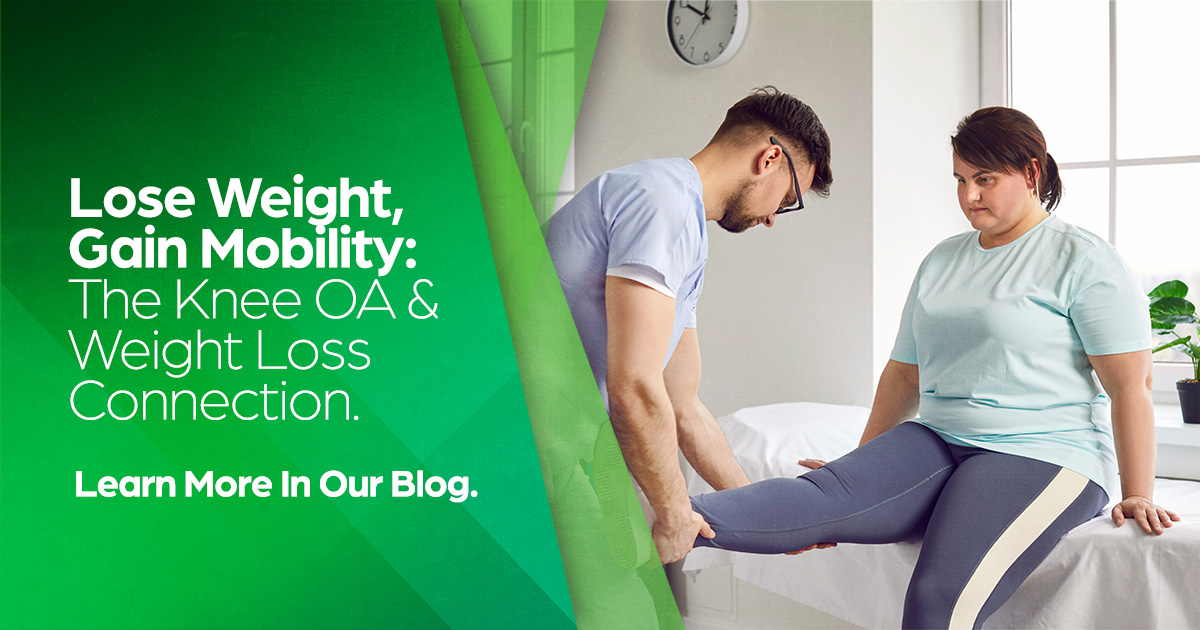Knee Osteoarthritis (OA) is a condition that affects millions of people worldwide, causing pain, stiffness, and reduced mobility. If you or a loved one is living with Knee OA, you’re likely familiar with the daily struggles it can bring. However, there’s a glimmer of hope that might just alleviate some of that pain: the connection between weight loss and Knee Osteoarthritis.
The Weighty Matter of Knee OA
Osteoarthritis is often associated with aging and wear and tear on the joints. While we can’t turn back the clock, there’s one factor within our control that can make a significant difference: our weight.
Studies from reputable medical sources such as the Arthritis Foundation and the National Institute of Arthritis and Musculoskeletal and Skin Disease confirm that excess weight places additional stress on your knees. Think of it this way: every extra pound you carry puts about four times the amount of stress on your knees. It’s like having a small sack of potatoes strapped to each knee every time you take a step!
The Weight Loss Solution
Now, here’s the good news: losing weight can reduce that extra burden on your knees, leading to significant relief from Knee OA symptoms. Here’s how it works:
- Reduced Pressure: As you shed pounds, the load on your knees lessens. This means less wear and tear on the joint, allowing for better joint function and less pain.
- Anti-Inflammatory Effects: Weight loss often leads to a decrease in the body’s production of inflammatory chemicals, which are known to exacerbate OA symptoms.
- Improved Mobility: Carrying excess weight can limit your ability to move comfortably. Shedding those pounds can improve your mobility and make it easier to perform daily activities.
What the Experts Say
Medical experts widely acknowledge the connection between weight loss and Knee OA relief. Research published by the Arthritis Foundation states that “a 5% reduction in body weight can result in a 20% improvement in pain and function.”
The American College of Rheumatology recommends weight loss as a non-drug treatment for OA, emphasizing its effectiveness in reducing pain and improving function.
Getting Started on Your Weight Loss Journey
Before embarking on any weight loss program, it’s crucial to consult your healthcare provider. They can offer personalized advice and ensure your weight loss plan is safe and tailored to your specific needs.
Here are some general tips to consider:
- Balanced Diet: Focus on a balanced diet rich in fruits, vegetables, lean proteins, and whole grains. Avoid excessive consumption of sugary or processed foods.
- Regular Exercise: Incorporate low-impact exercises like swimming, cycling, or walking into your routine to improve joint flexibility and strengthen muscles around the knee.
- Portion Control: Be mindful of portion sizes to manage calorie intake effectively.
- Gradual Progress: Aim for a gradual, sustainable weight loss of 1-2 pounds per week.
- Support System: Consider joining a weight loss group or working with a registered dietitian or personal trainer for guidance and support.
The connection between weight loss and Knee Osteoarthritis relief is clear and well-supported by medical research. By shedding pounds, you can reduce the strain on your knees, alleviate pain, and improve your overall quality of life.
Participate in North Georgia Clinical Research’s Trials!
Are you eager to make a difference? North Georgia Clinical Research is leading the way, and you can be a part of it. Right now, we are actively enrolling participants for groundbreaking weight loss and Knee Osteoarthritis clinical trials in Woodstock, GA. Your involvement can be the key to finding solutions.
Visit our website and complete the form to explore these opportunities further. By taking this step, you’ll help us take a significant stride toward a healthier and brighter future for Georgia.


